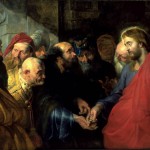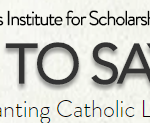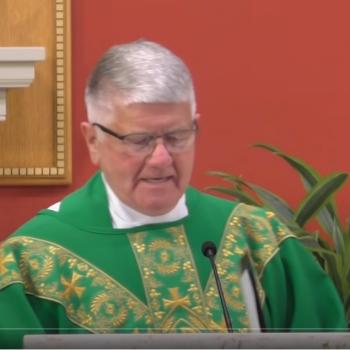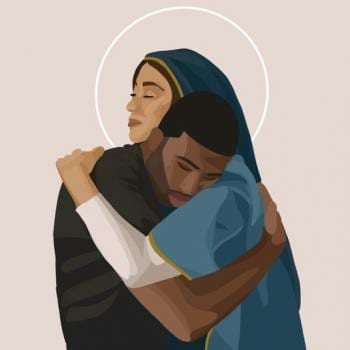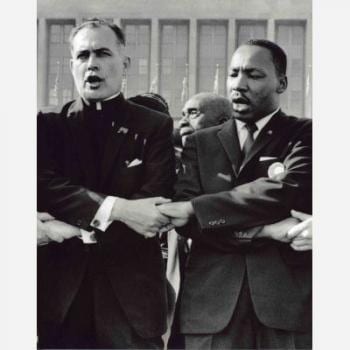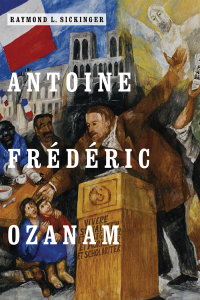
Antoine Frédéric Ozanam
by Raymond Sickinger
412 pages, University of Notre Dame Press
$60.00
Raymond Sickinger, a professor of history at Providence College, has written an impressive new biography of Blessed Frédéric Ozanam, the mid-19th Century French layman who Pope St. John Paul II called an “apostle of charity” and “a precursor of the social doctrine of the Church.” As a 20 year-old student, Ozanam founded the Society of St. Vincent de Paul, a lay Catholic apostolate focused on providing person-to-person service to the poor. The name of the organization was taken from the 17th Century “apostle to the poor,” the priest Vincent de Paul. Today, the Society is a global movement with 800,000 members, known as Vincentians, in 140 countries.
Sickinger’s most important contribution here is his rigorous scholarship. In this book, he has clarified the details of Frédéric’s life and work, sweeping away much of the hagiographical detritus that has grown up around Ozanam. Over the course of many years, Sickinger pored through primary material, much of it gleaned from records at the headquarters of the International Society of St. Vincent de Paul in Paris, and at the Sorbonne itself. The result for readers interested in the origins of the Society is a much clearer, more deeply human portrait of Frédéric as son, student, husband, father, friend, sufferer, and devoted servant of the poor. Thanks to Sickinger’s faithfulness to his authentic subject – which is to say, the man himself, not the image of the man – this book is sure to become the definitive biography of Ozanam for decades, if not longer.
What Sickinger’s book also reveals is that Ozanam lived in a time very much like our own, when many of the same questions about poverty, inequality, and injustice – and the dangers that flow from them – were roiling the West, including France. Ozanam himself gives a flavor of his times in passages like this:
“The question that divides the men of our time is no longer a matter of political forms, but rather a social question. The issue is to know who will triumph: the spirit of egoism or the spirit of sacrifice; or whether society will be either a large-scale exploitation for the good of the strongest, or a consecration of each person for the good of all, and especially for the protection of the weakest. Many men have too much and want even more; there are also many more who do not have enough, or who have nothing, and who want to take what others do not give them. Between these two types of men, a struggle is being prepared, and it promises to be terrible. On the one side is the power of gold; on the other, the power of despair.”
But it wasn’t just Ozanam who was analyzing the decomposition of society and formulating a response. In England, Karl Marx was gathering his prodigious descriptive and prescriptive abilities into an explosive ideology which would burst upon the world in 1848 with the publication of The Communist Manifesto (and, it is worth noting, an obscure book titled The Class Struggles in France, published in 1850). Of course, though analyzing the same social phenomena, Marx and Ozanam came to very different conclusions about what to do. Marx, the materialist, foresaw and encouraged “the forcible overthrow of all existing social conditions.” Ozanam, the Catholic, discovered “our Christian duty to intervene between these irreconcilable enemies.”
In a brilliant and most valuable chapter titled “Systemic Thinking and Systemic Change,” Sickinger traces Ozanam’s theory of Christian intervention as both a platform for advocacy (justice) and a practical program of direct action (charity). Where Marx saw the “proletariat” as a single engine in the complex machinery of a vast dialectical process, Ozanam saw the poor as individual persons; and more, as his masters! Where Marx foresaw both justice and charity as end-products of the inevitable historical triumph of the working classes, Ozanam saw justice in a peaceful restoration of social equilibrium and charity in a Christian bringing food and clothing to his destitute neighbors. Sickinger shows how these and other seeds of Ozanam’s theory and praxis served as a basis for Catholic Social Teaching, beginning with Pope Leo XIII’s Rerum Novarum, and continuing to this day. He also demonstrates that these seeds evolved into the strong root of the Society of St. Vincent de Paul’s work as it approaches its 200th anniversary.
Finally, in his chapter, “An Enduring Legacy,” Sickinger highlights Ozanam’s influence on Dorothy Day and Peter Maurin, both directly and indirectly through the work of the French personalist Emmanuel Mounier, who was himself a member of the Society of St. Vincent de Paul:
In her 1939 book, House of Hospitality, Day commented: “I have been reading a lot of Ozanam lately.” Day found Ozanam’s thoughts and actions compelling. She and … Peter Maurin firmly believed “that the work is more important than the talking and writing about the work. It has always been through the performance of the works of mercy that love is expressed, that people are converted, that the masses are reached.” Citing several passages taken directly from Ozanam’s writings, Day concluded that “in season and out of season, he [Ozanam] pleaded for ‘the annihilation of the political sprit in the interests of the social spirit'” Ozanam’s influence on the Catholic Worker Movement also extends beyond Day’s comments in her 1939 book. Peter Maurin, for example, was profoundly influenced by the thought of the 20th Century French philosopher and theologian Emmanuel Mounier … the founder of the French School of personalism, [who] was profoundly influenced by Frédéric Ozanam. As a member of the Society of St. Vincent de Paul in Grenoble, Mounier first actively experienced poverty and gained a deeper understanding of the terrible conditions in which many workers lived. Mounier openly praised Ozanam as one of the few Catholic intellectuals of his time to recognize that the Catholic Church had to embrace the issue of poverty.
Ozanam is a relatively unknown but important, even pivotal figure in the Church’s recent history. Whether you are a Vincentian, Catholic Worker, both, or neither, I can’t think of a better introduction to the inspiring life and enduring legacy of Antoine Frédéric Ozanam. Buy it here.

